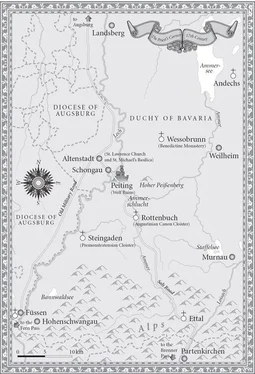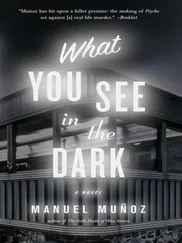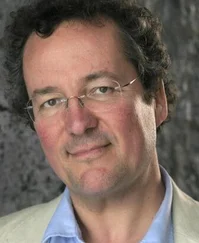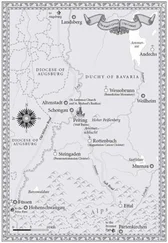Oliver Potzsch - The Dark Monk
Здесь есть возможность читать онлайн «Oliver Potzsch - The Dark Monk» весь текст электронной книги совершенно бесплатно (целиком полную версию без сокращений). В некоторых случаях можно слушать аудио, скачать через торрент в формате fb2 и присутствует краткое содержание. Жанр: Исторический детектив, на английском языке. Описание произведения, (предисловие) а так же отзывы посетителей доступны на портале библиотеки ЛибКат.
- Название:The Dark Monk
- Автор:
- Жанр:
- Год:неизвестен
- ISBN:нет данных
- Рейтинг книги:5 / 5. Голосов: 1
-
Избранное:Добавить в избранное
- Отзывы:
-
Ваша оценка:
- 100
- 1
- 2
- 3
- 4
- 5
The Dark Monk: краткое содержание, описание и аннотация
Предлагаем к чтению аннотацию, описание, краткое содержание или предисловие (зависит от того, что написал сам автор книги «The Dark Monk»). Если вы не нашли необходимую информацию о книге — напишите в комментариях, мы постараемся отыскать её.
The Dark Monk — читать онлайн бесплатно полную книгу (весь текст) целиком
Ниже представлен текст книги, разбитый по страницам. Система сохранения места последней прочитанной страницы, позволяет с удобством читать онлайн бесплатно книгу «The Dark Monk», без необходимости каждый раз заново искать на чём Вы остановились. Поставьте закладку, и сможете в любой момент перейти на страницу, на которой закончили чтение.
Интервал:
Закладка:
“My most valuable shipment!” he exclaimed, pounding his fist on the polished oak table. “Around a thousand guilders! Cloth, fustian, silverware-to say nothing of all the spices! How can this be? Goddammit! I thought the hangman had smoked out the accursed band of robbers!”
The aldermen started grumbling and Johann Lechner admonished them, tapping his signet ring against a full glass of port wine, demanding silence. “Gentlemen, I’ve called the council together to make an important announcement. Silence!” He pounded the table with his hand. “Quiet, for God’s sake!” The murmuring stopped at once, and all eyes turned to the clerk. As the representative of the elector in the absence of the administrator, Lechner really had no business being in the city’s town hall, but as things turned out, he’d become the chairman of the meetings. During the Great War, people were glad to have a strong hand in charge, and since that time there had been no reason to change what was tried and true.
After things had finally quieted down, the clerk proceeded. “I actually wanted to call this meeting of the council to inform you that the band of robbers has finally been caught and commercial traffic can resume. The hangman, along with many honorable citizens, has done an outstanding job.”
“Truly an outstanding job,” the patrician Jakob Schreevogl murmured. “Honorable citizens have created a bloodbath!”
Nobody was paying attention to him, however. All eyes were directed now at the clerk, who continued speaking in an earnest tone. “But now it appears there’s more to it. As much as I regret to say so, there seems to be a second band of robbers. The executioner has already questioned the head of the first group, Hans Scheller, about it.”
At once, the general whispering resumed. Michael Berchtholdt, who, as a baker, sat in the Outer Council, spoke up. “I hope Kuisl introduced the scoundrel to the hot irons! He should break every bone in his body, one by one.”
“Well, the hangman has used…his own methods.” Lechner replied, and Michael Berchtholdt, as well as the other aldermen, seemed pleased with that answer. It was good to have someone like Jakob Kuisl take care of the dirty work.
“A second gang of robbers!” Matthias Holzhofer lamented. “Will there be no end to this highway robbery?”
“Master Holzhofer, please excuse me for asking,” young Jakob Schreevogl interrupted. As owner of Schongau’s largest stove-fitting company, he had been a member of the Inner Council for only a short time. “Isn’t it extremely risky to send such a valuable shipment to Fussen in troubled times like these? Whether there is one gang of robbers out there or several, you are positively asking for trouble!”
Matthias Holzhofer shrugged. “The word was that the Scheller gang had been captured-and anyone sending out a wagonload of goods under these conditions gets the best prices.” He grinned and twirled his clipped Vandyke. “There’s not much competition in this wretched cold. Moreover…” He hesitated before continuing. “We took a route through small villages, avoiding the main roads. It takes longer but avoids the woods along the major roads where the bandits lie in wait. Who would ever suspect that there, too…” He stopped short and shook his head.
Johann Lechner cleared his voice before beginning to speak again. “It’s not the first time a band of robbers has attacked travelers on back roads,” he began. “The Augsburg merchant Leonhard Weyer was killed by robbers a few days ago the same way. I happened to be in Semer’s Tavern just the night before when he told me about his plan to take the old cow path to Fussen.”
Burgomaster Karl Semer, owner of the tavern on the market square, interrupted him. He was breathing heavily under a red velvet jacket, and his eyes bulged with emotion. “Oh, God, two of my drivers told me recently that they were taking a route different from the usual one, too,” he gasped. “At least one of them has been reported missing, and I haven’t heard a thing about the other yet…” He wiped the sweat from his brow and took a deep gulp of port wine. Despite the bitter cold outside, a huge green tile stove made the town council chambers almost unbearably hot.
An anxious murmur came from the back of the room, where the members of the Outer Council and other ordinary residents sat. Almost all of them had sent a wagon with goods to other Bavarian cities in recent days and weeks. Those who could not go by river ferry depended on the Schongau wagon drivers, who had been in bitter competition with those from Augsburg for years. What would happen if other wagons were attacked?
“Just a moment!” said Jakob Schreevogl, raising his voice. “If I understand correctly, all these wagon drivers have decided to take an unfamiliar route. Nevertheless, they were attacked. That means either that highwaymen are roaming all the roads now, which I doubt, or…” He gazed out at the other members of the council. “Someone out there has been spying and giving specific directions to the robbers.”
“Who would that be?” Matthias Holzhofer interrupted. “My men have discussed it only with me.”
“And mine, too,” said Burgomaster Semer. “Nobody here knew this fellow Weyer from Augsburg. Who might he have spoken with?”
“Maybe it was the Augsburgers themselves who killed our people!” cried out the baker Michael Berchtholdt from the back of the room. “Our wagon drivers have always been a thorn in their side. If they had their way, they would be the only ones transporting goods from Venice and elsewhere.”
“Nonsense,” replied Jakob Schreevogl. “Weyer was himself an Augsburger. They aren’t going to kill their own people.”
Berchtholdt shrugged. “Perhaps he was a maverick. Who knows? Someone other Augsburgers had a score to settle with? Those damn Swabian punks!”
There was a murmur of approval in the room.
Johann Lechner tapped his signet ring against his wineglass again. “Quiet! We won’t get anywhere like this!” he shouted. “We can only hope that the two injured wagon drivers can give us information about the bandits. Perhaps that way we can learn who’s behind this.” Before proceeding, he examined the face of each member of the council. “It must be our common mission to put an end to this second gang of robbers as well. I suggest, therefore, sending the hangman out with a group of men again.”
“What? Put the hangman at the head of a group of honorable men again?” Burgomaster Semer shook his head in disbelief. “My son told me about the hunt. It’s outrageous that an executioner was put in charge of honorable citizens. Chasing and executing people is the job of hangmen, bailiffs, and court officers. If they hear of this in Munich or Landsberg, participants in this hunt will quickly lose their rights of citizenship.”
“They’ll lose their rights of citizenship when they ignore directions and slaughter a gang that includes women and children!” Jakob Schreevogl interrupted. “Your son and Berchtholdt’s have blood on their hands-more than the hangman in his entire life!”
“What an outrageous insinuation!” Berchtholdt shouted. “My son kept things from getting worse. Scheller and his bloodthirsty companions were about to kill us!”
“Silence, for God’s sake!” Johann Lechner shouted, louder than usual. Quiet quickly returned to the room. It was rare for the clerk to lose his composure, and after a few moments, he got a hold of himself again. He took a deep breath. “Arguing and brawling won’t get us anywhere,” he finally said. “I’ll send the hangman out again. He has shown that he understands what he’s doing. But this time, only the men who are actually suited for the job will go with him.” He cast a sideways glance at the burgomaster. “Your son and the son of the baker certainly are not; they’ve already demonstrated that. As far as the Scheller gang is concerned…” Lechner paused as if thinking it over. “Hans Scheller has already confessed. In my opinion, further torture is not necessary. With the agreement of the council, I can begin the trial as representative of the elector in the next few days. The execution will take place shortly after-the sooner the better-as an example to the other gangs.”
Читать дальшеИнтервал:
Закладка:
Похожие книги на «The Dark Monk»
Представляем Вашему вниманию похожие книги на «The Dark Monk» списком для выбора. Мы отобрали схожую по названию и смыслу литературу в надежде предоставить читателям больше вариантов отыскать новые, интересные, ещё непрочитанные произведения.
Обсуждение, отзывы о книге «The Dark Monk» и просто собственные мнения читателей. Оставьте ваши комментарии, напишите, что Вы думаете о произведении, его смысле или главных героях. Укажите что конкретно понравилось, а что нет, и почему Вы так считаете.












